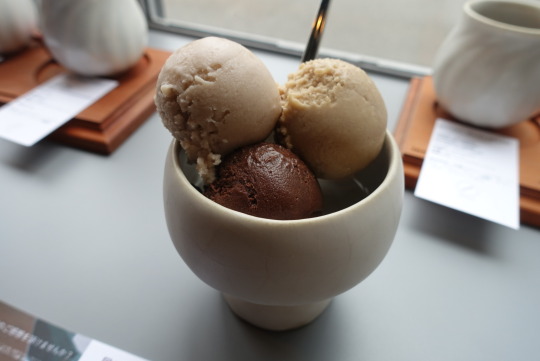#Soymilk
Explore tagged Tumblr posts
Text
Sissification kink? Oh, I thought you said Sisyphusication kink. Now roll that boulder, slut.
284 notes
·
View notes
Text
If you take your morning meds with soymilk, they may hit harder and take longer to wear off. If you do this habitually and then stop drinking soymilk for a while, you may encounter the other kind of problems.
11 notes
·
View notes
Text


12 notes
·
View notes
Text
How to Make Rice Milk with Cooked Rice
To make rice milk with cooked rice, you'll need just a few ingredients and a blender. Here’s a simple recipe:

Ingredients:
1 cup of cooked rice (white or brown)
4 cups of water (adjust for desired thickness)
1-2 tablespoons of sweetener (optional, like honey, sugar, or maple syrup)
1 teaspoon of vanilla extract (optional)
A pinch of salt (optional)
Instructions:
Blend the Ingredients:
Place the cooked rice, water, sweetener, vanilla extract, and salt in a blender.
Blend on high until the mixture is smooth and well-combined. This usually takes about 1-2 minutes.
Strain the Mixture:
Pour the blended mixture through a fine mesh strainer, cheesecloth, or nut milk bag into a large bowl or pitcher. This will remove any leftover rice solids and make the milk smooth.
Store and Serve:
Transfer the strained rice milk into a container with a lid.
Store in the refrigerator for up to 4-5 days. Shake well before each use, as it may separate over time.

Tips:
Adjust the sweetness and thickness to your preference by adding more or less water and sweetener.
You can use the leftover rice pulp in baking or add it to smoothies.
Enjoy your homemade rice milk!
#Milk#Dairy#MilkLover#MilkLife#GotMilk#cooking#kitchen#HempMilk#AlmondMilk#OatMilk#SoyMilk#CoconutMilk#RiceMilk#CashewMilk#MilkRecipes#PlantBasedRecipes#VeganRecipes#CookingWithMilk#MilkShake#Smoothie
3 notes
·
View notes
Text








deranged mouse sketches from last night with Soymilk in vc
4 notes
·
View notes
Text
Rice Milk vs. Almond Milk: Which Is Better?
When choosing between rice milk and almond milk, it often depends on individual dietary needs, taste preferences, and nutritional goals. Here's a comparison to help you decide which might be better for you:
Nutritional Content
Rice Milk:
Calories: Rice milk typically has more calories than almond milk, averaging around 120 calories per cup.
Carbohydrates: It's higher in carbohydrates (around 22 grams per cup), making it a good option for those needing an energy boost.
Fat: Rice milk is low in fat, with around 2-3 grams per cup.
Protein: It has very little protein, usually less than 1 gram per cup.
Almond Milk:
Calories: Almond milk is lower in calories, with unsweetened versions having around 30-50 calories per cup.
Carbohydrates: It's low in carbohydrates, with only 1-2 grams per cup, making it a better choice for those on low-carb diets.
Fat: Almond milk contains more fat, usually around 2.5 grams per cup, but it's mostly healthy fats.
Protein: Almond milk has slightly more protein than rice milk, but still only about 1 gram per cup.
Taste and Texture
Rice Milk:
It has a thinner consistency and a slightly sweeter taste due to the natural sugars released during the processing of rice.
Almond Milk:
Almond milk is creamier and has a nuttier flavor, which many people find appealing in smoothies, coffee, and cereals.
Allergen Considerations
Rice Milk:
Rice milk is hypoallergenic, making it a safer option for those with nut allergies, soy allergies, or lactose intolerance.
Almond Milk:
Almond milk is not suitable for those with nut allergies. However, it's a popular choice for people avoiding dairy and soy.
Environmental Impact
Rice Milk:
Rice farming requires a lot of water and contributes to methane emissions, making rice milk less environmentally friendly than almond milk.
Almond Milk:
Although almond farming also requires significant water, especially in drought-prone areas, it generally has a lower environmental impact compared to rice milk due to its lower carbon footprint.
Fortification
Both rice milk and almond milk are often fortified with essential nutrients like calcium, vitamin D, and vitamin B12. This fortification makes them more comparable to dairy milk in terms of nutritional value, especially for those relying on plant-based milk for these nutrients.
Conclusion
Best for Taste and Texture: Almond milk, with its creamy texture and nutty flavor.
Best for Low Calories and Carbs: Almond milk, particularly unsweetened versions.
Best for Energy Boost: Rice milk, due to its higher carbohydrate content.
Best for Allergies: Rice milk, as it's hypoallergenic and suitable for those with nut allergies.
Best for Environment: Almond milk generally has a lower environmental impact.
Your choice between rice milk and almond milk should be guided by your dietary preferences, nutritional needs, and environmental concerns.
#Milk#Dairy#MilkLover#MilkLife#GotMilk#HempMilk#AlmondMilk#OatMilk#SoyMilk#CoconutMilk#RiceMilk#CashewMilk#PlantBasedMilk#VeganMilk#DairyFree#NonDairy#LactoseFree#HealthyMilk#MilkBenefits#Nutrition#HealthyEating#Superfood#OrganicMilk#SustainableDairy#EcoFriendly#CrueltyFree#MilkRecipes#PlantBasedRecipes#VeganRecipes#CookingWithMilk
0 notes
Text
And it's a wrap!
Once again this is your friendly reminder the sormik celebration is never truly over, late entries are ALWAYS welcomed ;) You’re free to use any of the previous years' prompts, as long as you tag @sormikweek I will make sure to retweet/reblog your entries!
You can find all work made for this year under the tag #sormikweek2024.
I apologize for the shorter event this year (and for this late closing post), I will do better next time, especially since it will be the 10th anniversary of Sormik Week. I already have a theme in mind but I'd like to do something special for the occasion, do you have any ideas to make it more fun and challenging?
Feel free to contact me if you have any suggestions or questions!
I hope you all had to good time 💙
8 notes
·
View notes
Text
Where do you get your protein?
A common concern about vegetarian and vegan diets is that they may lack sufficient protein. But vegans can get protein from various plant sources, though some may be better than others. Seitan Seitan Seitan is an extremely popular protein source for vegetarians and vegans. Unlike many soy-based mock meats, it bears a striking resemblance to the look and texture of meat when cooked. Also…
#Amaranth#animal#animals#beans#Chia Seeds#diet#Edamame#environment#Ezekiel Bread#Food#fruits#Green Peas#Hemp Seeds#Lentils#life#lifestyle#Mycoprotein#nut butter#Nutritional Yeast#Nuts#Oatmeal#Oats#plants#protein#Quinoa#Seeds#seitan#SoyMilk#Spelt#Spirulina
0 notes
Text

Life's simple pleasures ~ 😌
Soy milk without sugar, beancurd, glutinous rice balls with peanut and black sesame fillings
0 notes
Video
tumblr
2 Essential Nutrients to Look for in Low-Fat Plant-Based Dairy? Discover the 2 things plant-based milks must be fortified with to give you and your family key nutrients 00:00 - Introduction 👼🥛 00:07 - Exploring Dairy Options Dive into the world of cow-based and plant-based milks. 🐄🌱 00:23 – List of Plant-Based Choices Discover the health and environmental benefits of alternative milks. 🌍💚 00:44 - Trying New Things Why it's essential to explore new dietary options. 🤔🔄 01:01 – Essential Considerations When Choosing Plant-Based What to look for in plant-based milks to ensure you’re getting key nutrients. 📊🌿
#ricemilk#hempmilk#almondmilk#soymilk#soyamilk#plantmilk#plantbasedmilk#plantbaseddiet#plantbasednutrition#plantsbased#plantedbased
0 notes
Text
#DairyAlternatives#PlantBasedMilk#NonDairy#VeganChoices#LactoseFree#NutMilk#SoyMilk#AlmondMilk#CoconutMilk#OatMilk#RiceMilk#CashewMilk#HempMilk#PeaMilk#FlaxMilk#QuinoaMilk#DairySubstitutes#HealthConscious#SustainableL
1 note
·
View note
Photo

Strawberry Dessert - Vegan Strawberry Gelato This vegan strawberry gelato recipe offers a different take on the traditional frozen treat.
0 notes



